Poll: The Bold Policies New York City Voters Want From Their Next Mayor
New polling shows NYC voters ready for a mayor to take strong steps towards affordable housing, police accountability, and reimagining public safety.

As New York City begins to reopen, its residents are preparing to decide who should be the next mayor. In the wake of the havoc wreaked by COVID-19, the decision is not a light one. The city faces a moment of truth amid the confluence of social, political, and economic crises—unemployment numbers still high, affordable housing still scarce, and civil unrest perpetually palpable. The city’s pandemic recovery rests on the mayor’s shoulders. With significant and far-reaching authority over the city’s departments, policies, practices, and budget, New York City’s next mayor possesses the power to implement reforms that transform how the city supports and protects some of its most vulnerable residents.
On June 22, New York City will vote in closed-party primaries, meaning that voters cast ballots for their party’s favored candidates to run in November’s general election. For a heavily Democratic city like New York, this means that primaries likely determine November outcomes. And this year, for the first time, New York City will use ranked-choice voting, allowing voters to rank their top five candidates in preferential order.
Ahead of the vote, a new poll from Data for Progress and The Lab shows that New York City voters are ready for a mayor who will use their broad power to implement bold policies.
We surveyed New York City voters on key issues central to the mayoral race, including affordable housing, homelessness, police accountability, and reimagining public safety. On each issue, we found strong voter support for progressive action.
New York City voters want the next mayor to address the lack of stable and affordable housing.
In New York City, landlords have filed more than 50,000 evictions since the start of the pandemic. While New York State’s extended eviction moratorium has these cases on pause through August 31, that solution only delays the worst effects of a crisis that continues to grow. The city still faces an onslaught of evictions that will disproportionately impact the Black and Latinx communities who were also hit hardest by COVID-19. It will be up to the next mayor to grapple with solutions to housing problems that existed long before—but have been exacerbated by—the pandemic.
- For 86% of voters, it is somewhat or very important that their mayor takes strong action on addressing the severe shortage of affordable housing and preventing evictions.
- 69% of voters, including 78% of Democrats, 56% of independents, and 51% of Republicans, support the mayor investing in affordable housing by partnering with and providing grants to Community Land Trusts (CLTs), which give nonprofit organizations the power to build and control affordable housing.
- 81% of voters, including 90% of Democrats, 75% of independents, and 49% of Republicans, support providing direct rental assistance to low-income New Yorkers.
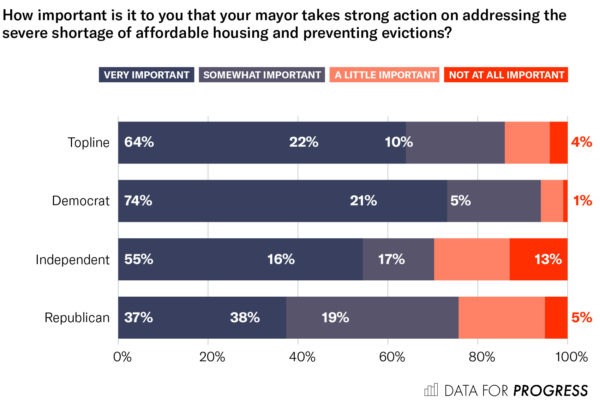
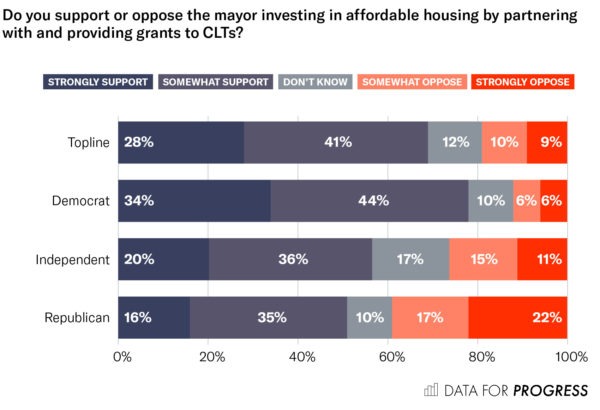
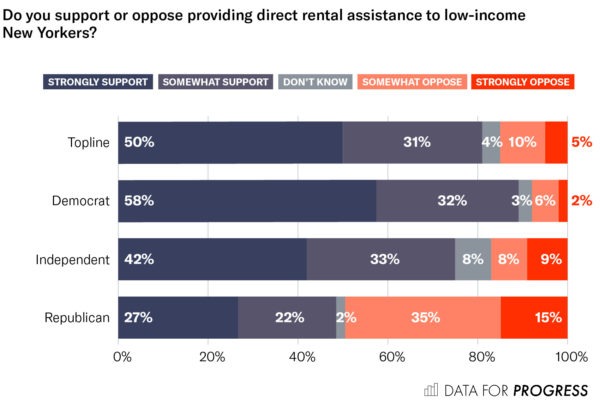
New York City voters are looking to the next mayor for solutions to the city’s homelessness crisis
One in every 106 New Yorkers is homeless and nearly 4,000 people sleep on the street, in the subway system, or in other public spaces every night. Throughout the pandemic, New York City rented hotel rooms for several thousand people, but a fight over housing men at the Lucerne Hotel on the wealthy Upper West Side highlighted already entrenched housing problems, including residential segregation and the city’s failure to develop long-term policy solutions to care for unhoused populations. And those who remained shelterless have been subject to violent attacks and encampment sweeps. Advocates who have long called for housing as an essential right in New York City want the next mayor to prioritize new ideas for supporting homeless populations, as do voters.
- 87% of voters said it is somewhat or very important that their mayor takes strong action on providing housing to the city’s homeless population.
- 77% of voters, including 86% of Democrats, 67% of independents, and 57% of Republicans, support the creation of a commission on homelessness that includes New Yorkers directly affected by homelessness or who face insecure housing conditions.
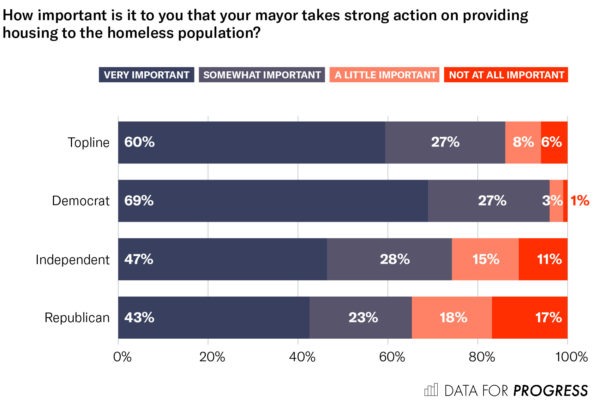
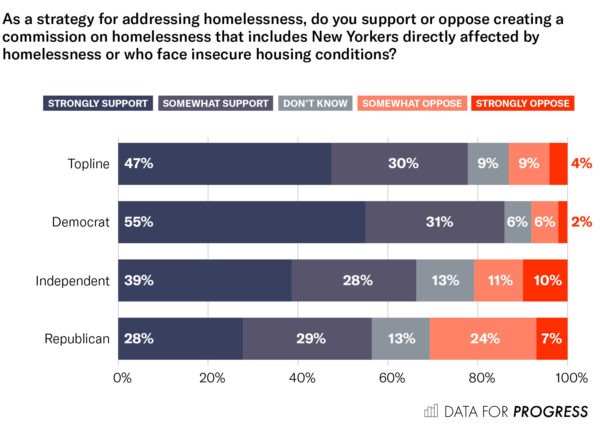
New York City voters want police accountability
According to a New York Times’ analysis, the NYPD rejected the Civilian Complaint Review Board (CCRB)’s recommendations for severe disciplinary action in 71 percent of 6900 misconduct cases over the last 20 years. And a 2020 semi-annual report by CCRB revealed that in the first half of the year, NYPD declined any punishment at all in 48 percent of serious officer misconduct cases that went to trial. The opacity of police misconduct records and the unilateral authority of the police commissioner in disciplinary actions carry grave consequences: Daniel Pantaleo, the former NYPD officer who murdered Eric Garner in 2014, had seven disciplinary complaints and 14 individual allegations filed against him at the time he took Garner’s life; it took five years for the police commissioner to fire Pantaleo. NYC voters in 2021 are hoping a new mayor can succeed where outgoing mayor Bill De Blasio failed on police reform.
- For 87% of voters, it is somewhat or very important that their mayor takes strong action on ensuring accountability for police misconduct.
- 80% of voters, including 87% of Democrats, 81% of independents, and 48% of Republicans, support making police officer misconduct records accessible to the public.
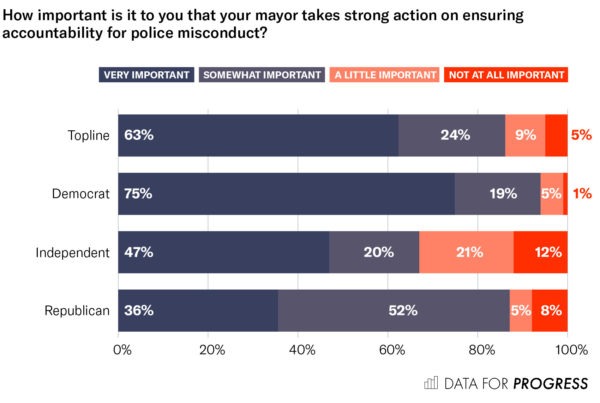
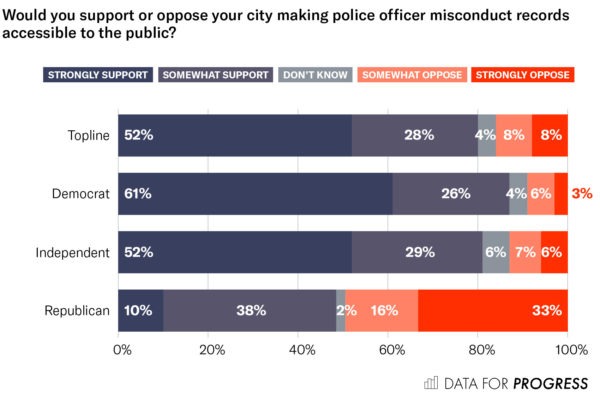
New York City voters want more public safety and less law enforcement
The debate about law enforcement’s role in ensuring public safety takes center stage in the New York City mayor’s race, with candidates’ positions ranging from defunding the police to establishing a revised “stop and frisk” program. Throughout the past year’s reckoning with racial injustice and police violence, more people have rejected the idea that public safety is inextricably tied to policing. Advocates, scholars, and experts have laid out the ways that police involvement in schools, traffic enforcement, and crisis intervention make communities and individuals less safe. They have also called out police departments’ failure to properly handle violent crime. The call for investing in non-law enforcement public safety initiatives resonated with New Yorkers.
- 75% of voters said it is somewhat or very important that their mayor takes strong action on increasing non-police public safety officers.
- 75% of voters, including 83% of Democrats, 61% of independents, and 64% of Republicans, support creating a new agency of non-police first responders, like emergency medical services or firefighters, to deal with issues related to substance use or mental illness that require a response.
- 58% of voters support the city replacing armed police officers stationed in public transport hubs like subways and bus stops with civilian enforcement.
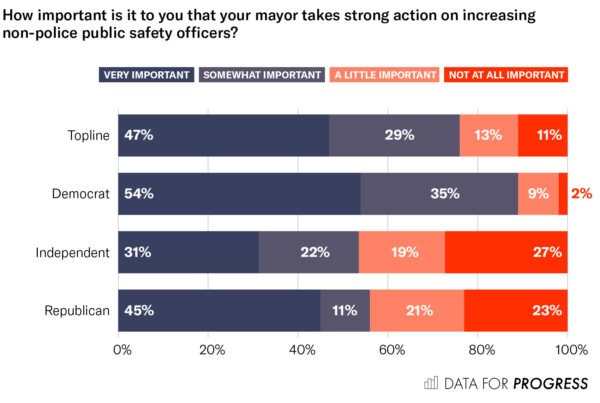
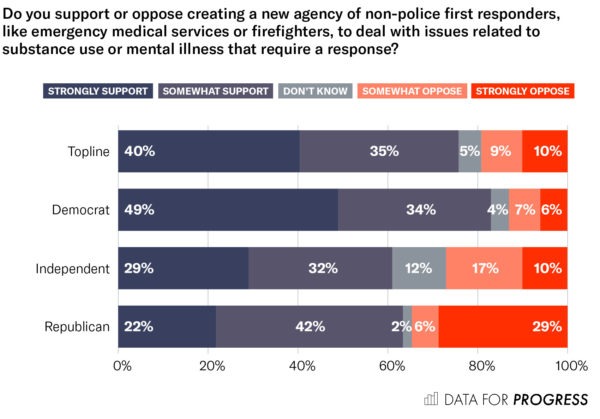
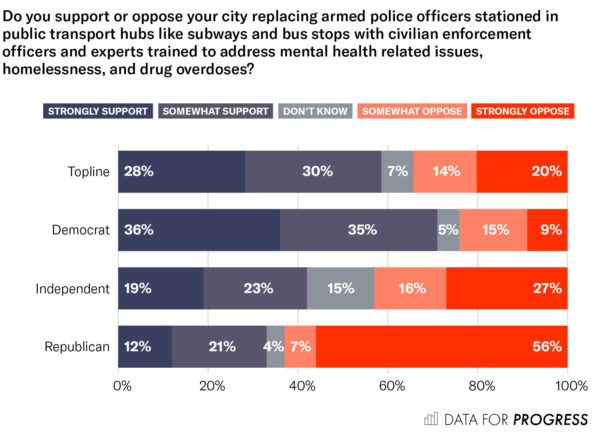
Polling Methodology
From May 21 to 27, 2021, Data for Progress conducted a survey of 512 likely voters in New York using web panel respondents. The sample was weighted to be representative of likely voters by age, gender, education, race, and voting history. The survey was conducted in English. The margin of error is ±4 percentage points.

